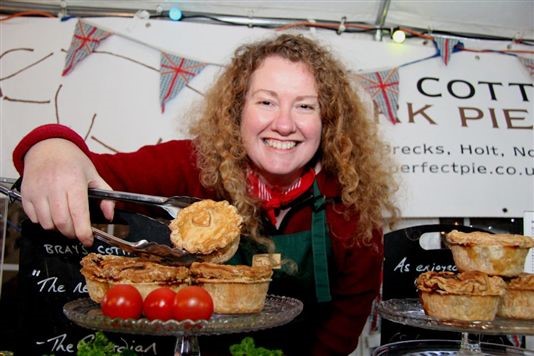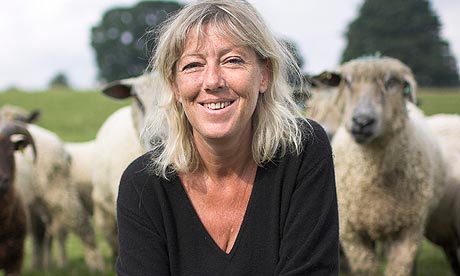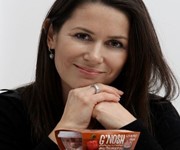In praise of foodie businesswomen

To mark International Women's Day, we bow down to five inspirational female food entrepreneurs.
Sarah Pettegree, Bray’s Cottage Pork Pies
 10 years as an accountant didn’t hit the spot for Sarah Pettegree (pictured above), who told me that “there has always been a business in me – it’s been an itch I’ve forever wanted to scratch”. So seven years ago, food lover Sarah took the plunge and started her own pork pie business in North Norfolk where she lives. They’re made from a hot water crust pastry, Norfolk-reared pork and a blend of secret herbs and spices, and come in flavours ranging from onion marmalade to chilli, chorizo and the award-winning ‘naked’ pork pie.
10 years as an accountant didn’t hit the spot for Sarah Pettegree (pictured above), who told me that “there has always been a business in me – it’s been an itch I’ve forever wanted to scratch”. So seven years ago, food lover Sarah took the plunge and started her own pork pie business in North Norfolk where she lives. They’re made from a hot water crust pastry, Norfolk-reared pork and a blend of secret herbs and spices, and come in flavours ranging from onion marmalade to chilli, chorizo and the award-winning ‘naked’ pork pie.
Sarah, who dabbled with the idea of being a full-time artist before committing to a life of pies, said that she started with nothing: “I decided that I didn’t want to invest any of my own money into the business – the pies would have to pay for themselves! So in the beginning all I had was a table, a kettle and a space in someone else’s premises.
“But luckily for us, people loved our pies right from the get go and we didn’t struggle. Sure, we have second-hand furniture in the office; but the sale of our pies does fund all of our salaries, and recently allowed us to buy a brand new four-tier oven, which can bake up to 360 pies at a time!”
Sarah, who sells her pies at local farmers’ markets, agricultural shows and pubs across London, shared some of her top tips for running a successful business: “You have to make sure the numbers add up properly, and you must look at them realistically. Get an accountancy package set up as soon as possible! What you need to add yourself is the ‘fairy dust’ – that is, solid branding, your personality, and fearlessness.”
As for being female? Sarah thinks it helped. “It was an advantage, if anything. ‘Pies’ is a typically male field, so the fact that a woman was making and selling them made Bray’s Cottage sound a bit more interesting. Plus you have to be able to multi-task when running a business… you know what they say!”
Izzy Lane, Farmaround
 Saxophonist Izzy Lane was on the brink of a full-time music career when the idea for Farmaround popped into her head. “I was fed up of being a frustrated singer songwriter, and wanted to take control of my destiny. So I decided to set up a business. It was always going to be something around organic food, because I feel so passionately about it. ”
Saxophonist Izzy Lane was on the brink of a full-time music career when the idea for Farmaround popped into her head. “I was fed up of being a frustrated singer songwriter, and wanted to take control of my destiny. So I decided to set up a business. It was always going to be something around organic food, because I feel so passionately about it. ”
Hence Izzy, who was desperate to promote the health and moral benefits of organic food, launched London’s first organic ‘box scheme’ in 1994, which allowed customers to buy bags of organic fruit, veg, dairy and more for delivery to the door.
“You couldn’t buy organic fruit and veg back in the early 90s, unless it was from a wholefood shop, and they had a terrible reputation for being overpriced. Organic food was also seen to be something only for hippies, which didn’t help matters. So I had a tough challenge ahead of me.
“But although most were dubious of my business model to begin with, Farmaround took off from day one and proved them all wrong. I’ve been completely inundated and haven’t played or sang a single note since!”
The success of Farmaround encouraged Izzy to launch into yet another venture in 2007: the ‘Izzy Lane’ ethical fashion label, which involves raising 500+ sheep on her own farm in the Yorkshire Dales solely for their wool. Her fashion business was awarded a RSPCA Good Business Award in 2008. And if that wasn’t enough, she also co-founded Good Food Nation in 2011, which sells dairy products and eggs from animals which will never be slaughtered.
Despite her numerous successes, Izzy believes it would have been an easier ride, had she been a man. “I found being a woman a definite disadvantage in business. It’s hard to keep your head above water when you’re a kind, sensitive sort… many people have taken advantage of my nature, and I’ve been subjected to fraud on numerous occasions. Mind you, just because you’re a woman doesn’t necessarily mean that you’re also good-natured and sensitive like me!”
Amelia Rope, Amelia Rope Chocolate
 We’ve already come across Amelia Rope at lovefood – her single origin chocolate bars won a spot in our top five small-scale British chocolate producers round-up, and I polished one of her ‘pale lemon and sea salt’ 100g bars off in under an hour once… whoops.
We’ve already come across Amelia Rope at lovefood – her single origin chocolate bars won a spot in our top five small-scale British chocolate producers round-up, and I polished one of her ‘pale lemon and sea salt’ 100g bars off in under an hour once… whoops.
Before she started making confectionery in 2007 (mint leaves dipped in chocolate were one of her very first specialities), Amelia was a practice manager of a doctor’s surgery in London. “I would usually work 12 hour days and often six days a week,” she told me. “The trigger [to leave] was seeing a life coach… she helped me take the leap and although I have never been so challenged in all my life, I’ve never regretted launching my own business.”
Amelia’s distinctive style of chocolate (she blends aromatherapy oils with either a Madagascan or Ecuadorian couverture) has won her a permanent spot on the shelves of Selfridges, Whole Foods, Liberty and Fenwick, and earned her a reputation for being one of the most fashionable brands in Britain.
Amelia, who does everything from package design to bookkeeping, deliveries and marketing, all on her own, says that she thinks there’s an entrepreneur in us all. “I’d encourage anyone who says they want to do their own thing to go for it. It may not happen the way you thought, but it will take you on the most awe-inspiring journey and you won’t believe who you meet and where you travel to!”
What about her top tips for wannabe entrepreneurs? “Be motivated. You may go to bed in floods of tears, but you need to be able to get out of bed the next morning and go for it. You also need determination, courage, a willing to take risks, self-belief, and an ability to laugh at yourself. Always be ‘you’ and trust that things have a way of working themselves out.”
Freya Sykes, Ella Riley’s Toffee
 Freya Sykes’ story began with an ancient toffee recipe, which was found in her grandmother Ella Riley’s dusty cookbook. The top secret recipe, which is over 100 years old, told Freya how to make toffee the traditional way. “It’s not like the toffee of today,” she told me. “It’s creamier and softer. It tastes like angels caressing your tongue!”
Freya Sykes’ story began with an ancient toffee recipe, which was found in her grandmother Ella Riley’s dusty cookbook. The top secret recipe, which is over 100 years old, told Freya how to make toffee the traditional way. “It’s not like the toffee of today,” she told me. “It’s creamier and softer. It tastes like angels caressing your tongue!”
“It’s the history angle that helped the business [in Wales] thrive. We’ve had our sweet and toffee shop for a few years now, and at first we thought the sweets would support the toffee; but from very early on it was clear that it would be the other way around”.
Freya employed her husband Steven, who makes up to 131kg of toffee every day, a year into the business – “it felt empowering to do that!” – and says that she has always had an entrepreneurial spirit. “I used to own a property company before I went into toffee, and business is in my family’s blood. It’s a definite advantage to have all that history and support when opening a new shop.
“Don’t be afraid and don’t hesitate – those are my top tips for setting up a business. If you’ve got a good idea, then go for it! Make sure you test your product on people other than friends and family, because they’re not the most subjective tasters.”
As for being female, it’s certainly helped in Freya’s line of work. “I know how much we women crave sweet treats, and I can tap into that. At least 70% of our customers are female, and I’m sure the other 30% are buying for women!”
“But I’ve been lucky – because I have seen complete and utter sexism in business before. It certainly does happen, and there’s still an old boys’ club mentality surrounding it. And that’s a great shame.”
Charlotte Knight, G’NOSH
 Life in the corporate world was “soul destroying” for Charlotte Knight, founder of G’nosh gourmet dips. “I needed a total lifestyle change,” she told me. “I’ve always been in love with both food and business, so I thought: "why not marry the two together?’”
Life in the corporate world was “soul destroying” for Charlotte Knight, founder of G’nosh gourmet dips. “I needed a total lifestyle change,” she told me. “I’ve always been in love with both food and business, so I thought: "why not marry the two together?’”
New Zealander Charlotte was not impressed with the range of dips on offer over here, and so decided to fill the gap by producing her own line. The recipes were all invented at home, and she tested them rigorously on friends, family, consumer groups and even party goers.
“Validate, validate, validate… you have to make sure that the vast majority likes your product. I held pop-up picnics during the Royal Wedding period to test my dips on a big crowd, and I kept adapting my recipes according to people’s feedback.”
It took 14 months to get G’nosh dips from Charlotte’s kitchen to the shop shelves, and a wide range of flavours – including beetroot and mint, babaghanoush and black bean – are now available from Budgens, Selfridges, Whole Foods, Ocado, John Lewis, and other retailers.
But for the first two months, Charlotte had to make all the dips by hand. “I’m obsessed with quality and wouldn’t compromise on it. It was difficult to find the perfect manufacturer, because most of them wanted to change something or other. So I resorted to plan B, and made all the dips myself in a commercial kitchen. It was brutal and I’ve never worked so hard in my life. That went on for two months, before I found a suitable manufacturer.”
Charlotte thinks it takes a certain person to achieve an entrepreneurial dream: “You’ve got to be able to juggle a lot of balls (which is where being a mother came in handy) and be innovative, creative, strong and gutsy. But the single, most important thing is to be your authentic self – authenticity carries stature with buyers. Show passion and emotion when selling your product; people buy people, after all.”
A final word, about her faith in female entrepreneurs: “Now is the time and place for strong women in business. I am one, I have many investing in my business, and I’d like to see more taking the plunge.”
And the rest…
 It was a tough slog, trying to narrow our list of inspiring females down to five. Here’s a few more, who we’d love to pay tribute to... cordon-bleu trained chef Kate Finch was inspired by a BBC Radio 4 programme on ‘Women in Business’ to launch Junior’s Pantry (ready-meals for primary school kids); Singapore-born Loretta Liu is the brains behind On Patisserie and cookery school in London, winning numerous awards for her macarons; Helen Browning OBE (pictured here) chairs the Food Ethics Council, is Chief Executive of the Soil Association, farms organically in Wiltshire and was awarded an OBE in 1998 for her contribution to organic farming; Chantal Coady set up Rococo Chocolates nearly three decades ago, and is still dedicated to supporting ethical trade for cocoa farmers; Mich Turner MBE, who owns the Little Venice Cake Company, set her sights on opening her own cake shop the moment she won her first cookery competition aged 15; and mother-of-three Sally Hares runs her own fresh foods kits business in her spare time.
It was a tough slog, trying to narrow our list of inspiring females down to five. Here’s a few more, who we’d love to pay tribute to... cordon-bleu trained chef Kate Finch was inspired by a BBC Radio 4 programme on ‘Women in Business’ to launch Junior’s Pantry (ready-meals for primary school kids); Singapore-born Loretta Liu is the brains behind On Patisserie and cookery school in London, winning numerous awards for her macarons; Helen Browning OBE (pictured here) chairs the Food Ethics Council, is Chief Executive of the Soil Association, farms organically in Wiltshire and was awarded an OBE in 1998 for her contribution to organic farming; Chantal Coady set up Rococo Chocolates nearly three decades ago, and is still dedicated to supporting ethical trade for cocoa farmers; Mich Turner MBE, who owns the Little Venice Cake Company, set her sights on opening her own cake shop the moment she won her first cookery competition aged 15; and mother-of-three Sally Hares runs her own fresh foods kits business in her spare time.
Are you a woman who set up your own business? Tell us about yourself in the Comments box below.
You might also like
International Women's Day - famous female cooks
Comments
Be the first to comment
Do you want to comment on this article? You need to be signed in for this feature